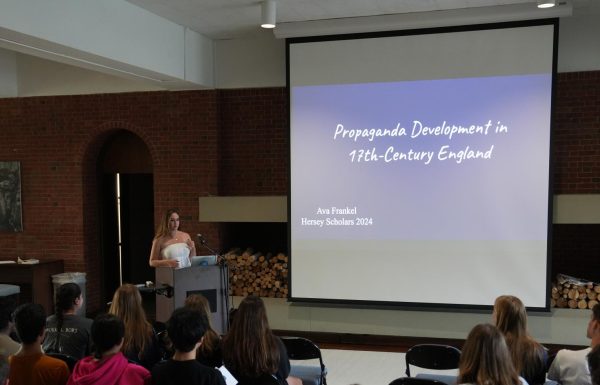The Honor Roll Hurts Hotchkiss
From the constant bombardment of emails from colleges to the over-analyzed college process, the pressures of being a student have never been higher. The median standardized testing scores have skyrocketed in recent decades as parents enroll their children in intense and draining test-prep courses in order to boost their chances of acceptance into top universities. Complex college admission schemes and scandals involving desperate American celebrities have rocked our nation. Parents have connotated success exclusively with the Ivy League. Most of all, there is a strong emphasis on grades and academic achievement. Today, we face an epidemic of obsession with success, and at the very heart of the issue is comparison with our peers. The Honor Roll has become an instrument of such toxic comparisons and creates a divisive and unhealthy work environment for all students.
In a study by Peter Kuhn, an economist at University of California Santa Barbara, 14% of households have bought a new car in a given year, but 21% will have bought a new car if their neighbor has also recently bought a car. The study confirms the veracity of the old idiom, “Keeping up with the Joneses,” where a household will compare itself to that of a perceived wealthier household and attempt to adjust their appearances accordingly. In other words, individuals are happier if they perceive themselves to be at a better position or higher socioeconomic class when compared to their peers.
Hotchkiss is no exception – students constantly compare themselves to their peers, especially in easily quantified measurements such as grades. Since it is posted for all to see, the Honor Roll has become a direct instrument for such comparisons. While some may argue that the Honor Roll does, in fact, motivate students and honors academic achievement (specifically, from Bren- d o n S t a l l a e r t ’s a r t i c l e l a s t J a n u a r y ) , these claims are faulty.
First, new studies have revealed that public recognition of student achievement as a motivating force is, in fact, not only unsuccessful but even counterproductive. And second, the recognition of student achievement is not beneficial and instead incentivizes easier classes and stymies intellectual challenge and freedom.
In a study by professors Leonardo
Bursztyn and Robert Jensen of University of Chicago and Wharton respectively, a student ranking system was implemented into a Texas public school. The study attempted to measure the accura- cy behind the claim that public recognition systems motivate students. Not only did the study disprove the claim, but it also proved that such systems actually demotivate students. Follow- ing the implementation of an academic ranking system, students performed 14% worse than when the system had not been implemented. The information from the study dispels any notion that our Honor Roll, a public ranking system, is productive for our community and students.
Moreover, Hotchkiss prides itself as an institution for students seeking intellectual challenges and freedom. However, the Honor Roll directly contradicts this aspect of Hotchkiss. In or- der to make First Honor Roll, students resort to taking a lower level course in which they would receive better grades. In turn, this creates a toxic and divided student body where some students look down on others for supposedly “taking it easy.” Additionally, the Honor Roll limits the intellectual freedom of students and de-incentivizes them from taking challenging courses, as students would struggle more and, thus, receive lower grades.
The most disturbing aspect of the Honor Roll is its effect on our students and our community: it contributes to the daily pressures students face and creates an unhealthy learning environment. Like the old idiom, “Keeping up with the Joneses,” says, it is human nature to derive happiness from comparing ourselves with our peers. By be- ing posted in Main Hallway, the Honor Roll’s reach is constant and pervasive. I can’t tell you how often I have seen my friends stare at the board as we walk past. It pains me to see how much of their self-esteem is predicated on a lone piece of paper. As for me personally, the Honor Roll is just another duty I have to fulfill on my road to (at least, what I believe to be) success. And yet, as all these pressures and roles to play start to add up, I find it increasingly difficult to balance and know it will one day prove too much. There is a reason why mental health is such a prevalent issue across all institutions of education. The Honor Roll very well could be the last paper cut in a thousand.












